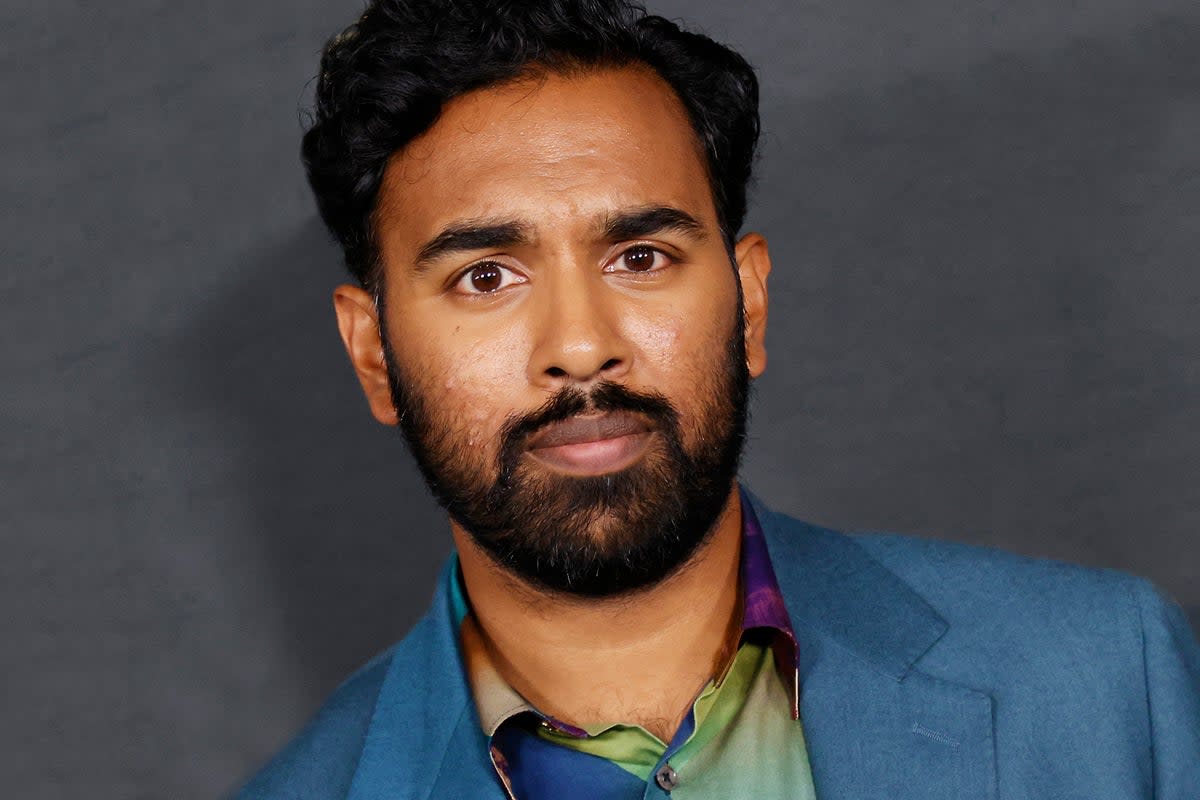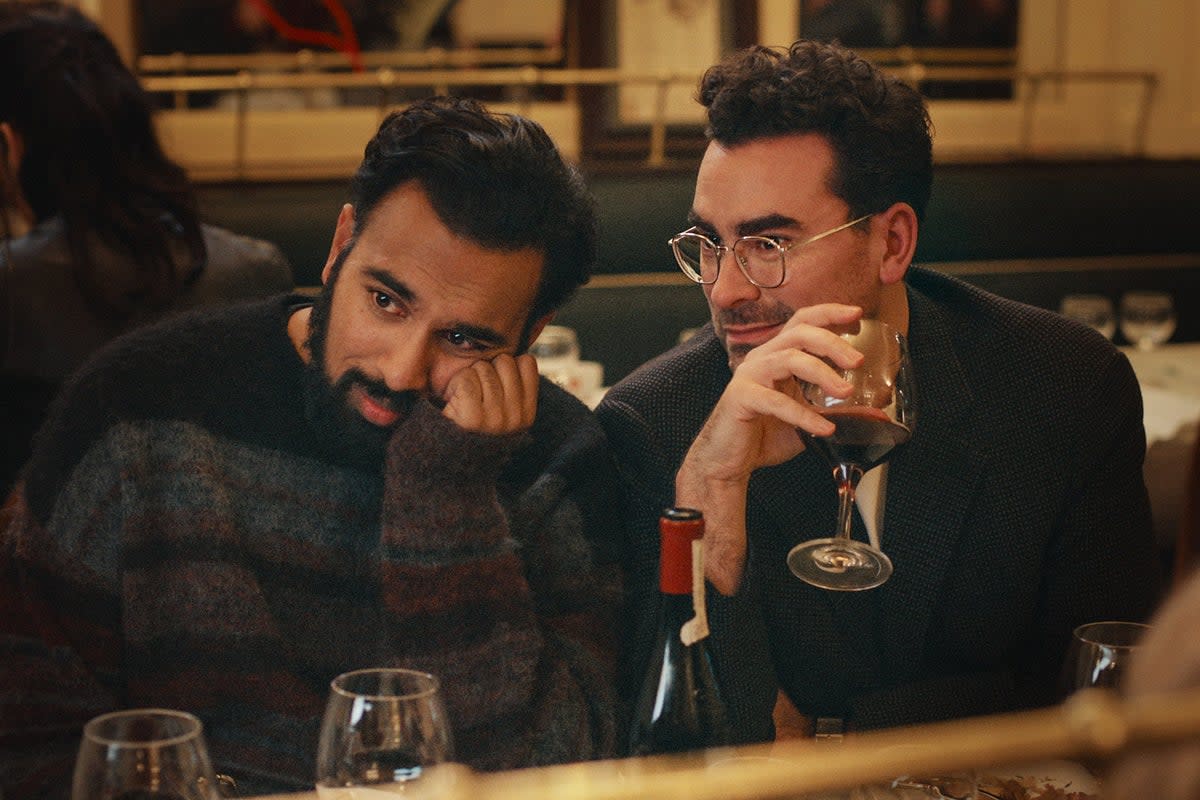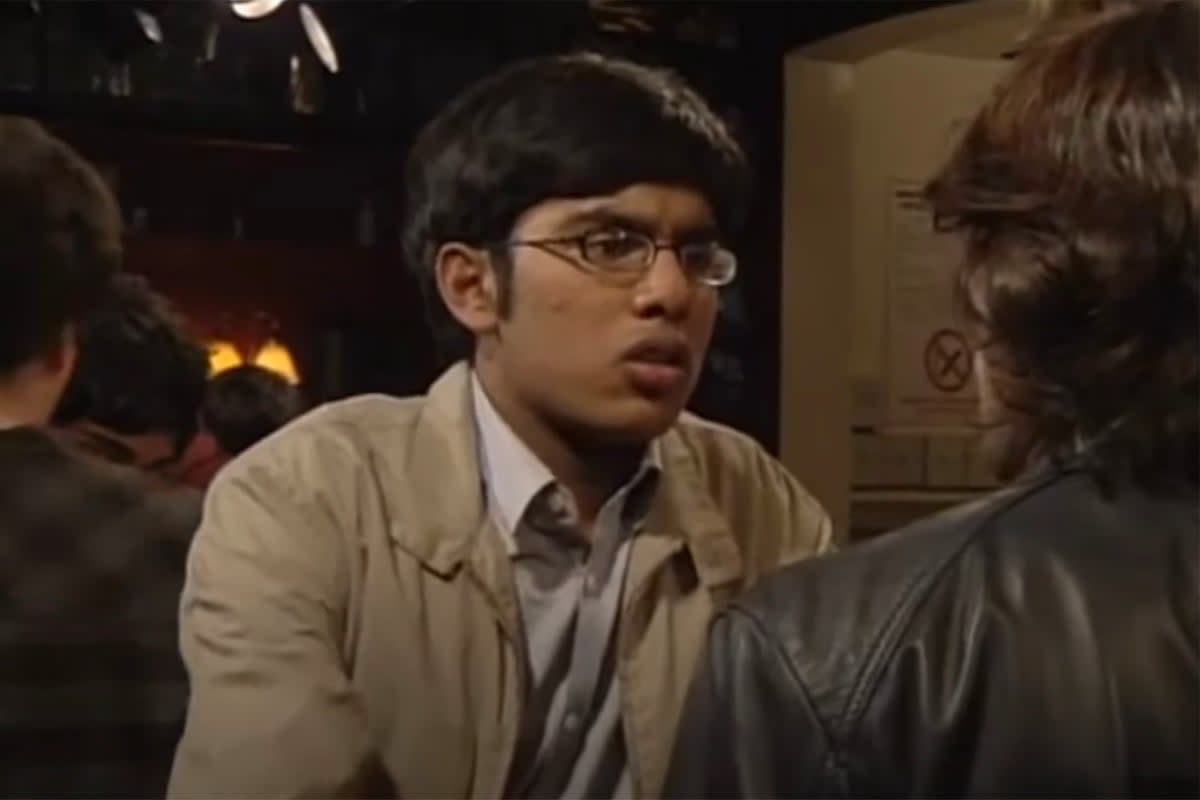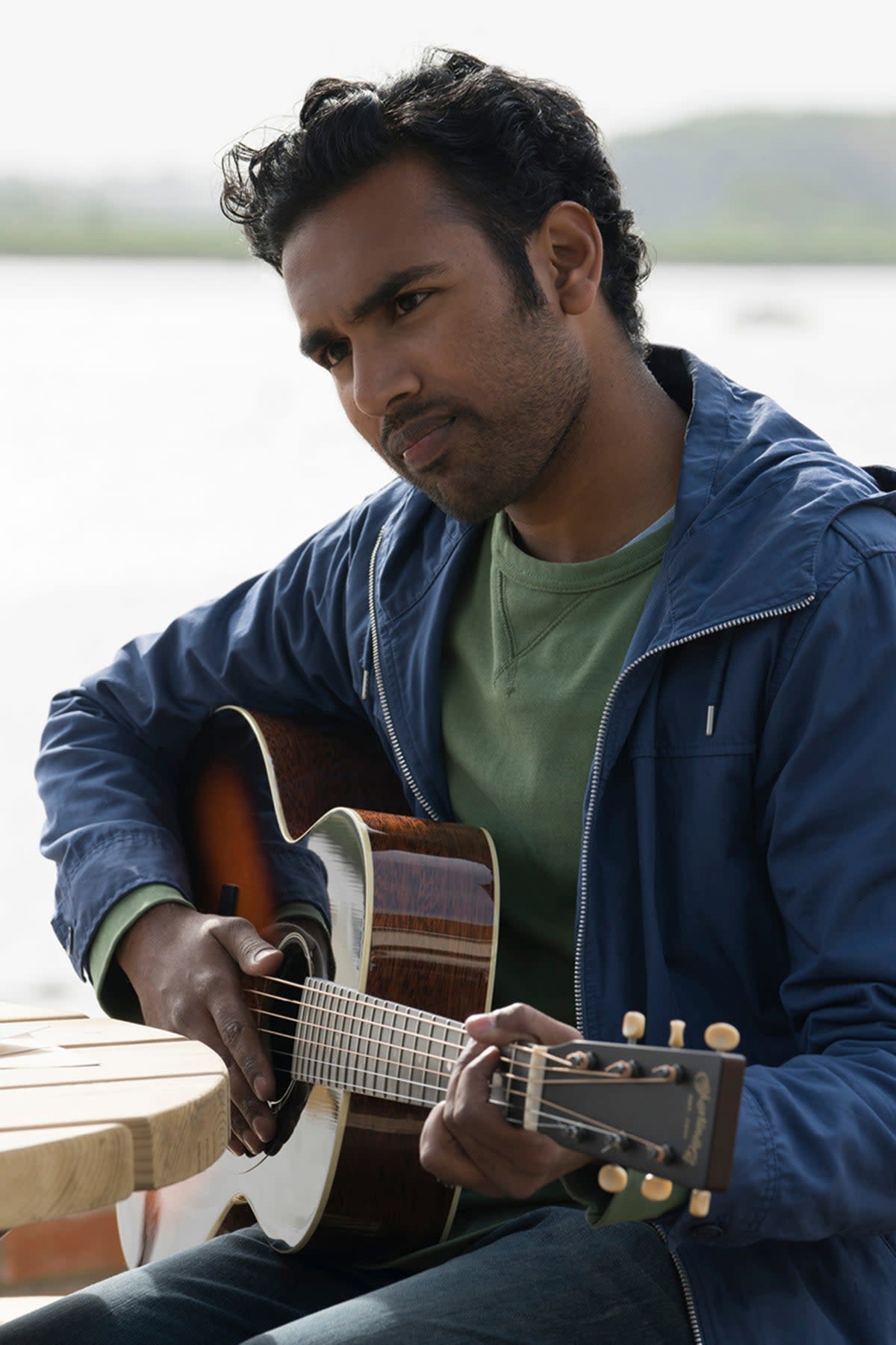Himesh Patel on his move to Hollywood: ‘You’re not meant to do nine years on EastEnders and then get a Danny Boyle movie’

Himesh Patel began his acting career in a state of panic. It was 2007, and on the morning of the then 16-year-old’s final GCSE exam, he received a phone call asking him to audition that afternoon for a role on EastEnders. The moment he finished the test, his dad rushed him to the casting. It was only as Patel read the character description that his nerves subsided. He was up for the part of Tamwar Masood, a somewhat geeky, studious boy with an older sister, whose parents ran a post office. All of that was true of Patel, too, and he aced the audition. He was a working television star before he’d even started his A-levels, but his real-life parents weren’t going to let him get swayed by glitz and glamour.
“I did the paper round until I was 21,” remembers Patel now, a little incredulously. “For five years of doing EastEnders, I was still doing the paper round. I hated it at the time, but looking back it kept me in check and stopped me getting carried away with being on telly and being mildly famous.”
Patel spent nine years on the long-running BBC soap, taking Tamwar from a bit-part character to a much-loved fan favourite who unexpectedly became a stand-up comic and married Danny Dyer’s onscreen daughter. Since leaving the show, he’s continued to confound expectations: first, by landing the lead in Danny Boyle’s Beatles-inspired romcom Yesterday, then by popping up as a suave fixer in Christopher Nolan’s Tenet and as Jennifer Lawrence’s journalist boyfriend in the end-of-the-world satire Don’t Look Up. In some ways, his rise is a remarkable one; in others, it is perfectly comprehensible. Patel is a natural everyman, with a quiet charisma and an earnestness that acts as a sort of narrative lightning rod. No matter how unfamiliar the world or outlandish the plot twist, Patel can ground it, make it real.
Today, he’s in a Los Angeles hotel room, 33 years old, bequiffed and full-bearded, talking calmly and quietly about death. He is telling me unhurriedly about one of his earliest memories: at just three years old, being taken by his mother to a village in Gujarat, in the west of India, for his grandfather’s funeral. “It was pretty full-on,” he remembers. “They laid his body out in the house. He was completely wrapped in a white cloth, [though] his face was on show. He’d donated his eyes to... science, I guess. It’s a bit grim. They’d put cotton wool in his eye sockets.” He hesitates for a moment, adrift in the past. “Maybe it was a bit traumatic,” he says evenly, his voice rich with the home counties. “But it’s not something that’s come up in therapy, so it’s fine. I think I was quite intrigued.”
Patel was transported back to this formative experience of communal mourning while reading the script for Schitt’s Creek creator Dan Levy’s new film Good Grief. The Netflix movie, which is streaming now, is a sweet, heartfelt meditation on loss that follows an artist’s attempts to deal with the sudden death of his husband – and the solace he finds in his closest friends. Patel remembers that, even as an infant, his natural instinct was to try to console those around him. “I remember seeing my mum and my grandma sobbing,” he says. “I remember trying to comfort my mum as much as I could. Grief is something that people go through every hour of every day, and knowing how to navigate it is so difficult. What I love about the story of this film, and I think – hopefully – what people take away from it, is that you can’t really do it on your own.”
Patel, Levy, and the Oscar-nominated Irish actor Ruth Negga play the trio of best friends at the heart of the film. They spent weeks together at Levy’s home in London prior to filming, baring their souls about their own experiences of love and loss. They also took part in bonding exercises, including a Crystal Maze-themed escape room, to help build up the chemistry and rhythms of a decades-long friendship.
Paul McCartney loved ‘Yesterday’? I had no idea!
“I wasn’t that adept at [the escape room] really,” says Patel, somewhat ruefully. “Dan did fairly well at this weird game where he was being interviewed by a ghost, or something. It was very funny.”
It was seeing Levy’s name on the script that first drew Patel to Good Grief. Levy has said that while his Emmy Award-winning sitcom Schitt’s Creek was a show about family, Good Grief centres the importance of chosen family. Patel, an avowed Schitt’s Creek fan, was thrilled to find that Levy’s voice remained clear and compelling despite the transition from comedy to drama. “He has a really lovely tone of humour and pathos,” says Patel. “I feel like that show did that so well. Even though it was ultimately a comedy, there was still a real heart to everything. He’s taken that to the big screen, as well as shifting tone. I think it’ll be quite unexpected for a lot of people. Maybe they’ll be expecting Schitt’s Creek: The Movie, but it’ll be very different.”
Patel, of course, is no stranger to wrong-footing expectations. As a child, he would sometimes adopt an accent and pretend to be an American, in homage to the characters he idolised on television. In reality, he was born in the small market town of Huntingdon in 1990 before moving to the even smaller village of Sawtry at the age of nine.

“Growing up there was nice,” he remembers. “It was a very remote sort of life.” His shopkeeper parents were at the heart of the village community, and some of his earliest acting experience was gained on the stage of the local panto. “The first one I did was Snow White, playing some sort of guard, then Peter Pan where I played one of the Lost Boys,” he remembers. Eventually, he graduated to leading-man status, with an early opportunity to display his knack for playing broken characters. “In Humpty Dumpty I played Humpty Dumpty,” he says. “Hopefully none of that footage ever sees the light of day.”
While Patel was still at primary school, his teachers were so impressed with his performances that they encouraged his parents to sign him up for children’s theatre. He joined the youth troupe at the Key Theatre in Peterborough, then the Young Actors Company in Cambridge. “They got me the audition for EastEnders when I was 16,” he explains. “It all went from there.”
If landing on EastEnders at 16 was life-changing, so too was the decision to quit the soap nine years later in search of other opportunities. “I didn’t necessarily leave EastEnders with any sort of intention to get to any certain level,” he says. “I just hoped I would have a career where I’d get to jump from one interesting thing to the next, and not have nine years of EastEnders seen as anything detrimental. But I was aware that there was, and perhaps still is, a certain perception of soap and the kind of actors who do soap, especially the kind of actors who do soap for a long period of time. So I didn’t really have high expectations.”

When he was invited to record a self-taped audition for a mysterious project to be directed by Danny Boyle, he saw it as a pipe dream. “I thought it was amazing that I was even on the list, but there were going to be hundreds of people doing this,” he remembers. “I thought, I’ll just do this and see how it pans out. Two auditions later, it panned out pretty well.”
Even now, he sounds disbelieving. “I think I still have slight imposter syndrome about the whole thing, because people aren’t meant to go on that journey,” he says. “That’s not meant to happen. You’re not meant to do nine years on EastEnders and then get the lead role in a Danny Boyle movie. I’m glad I’m an example that it can be done. I hope I’m not the last young actor who establishes themselves on a soap.”
He’s self-aware enough to acknowledge, though, that even if his route to success was unconventional, it wasn’t without advantages. “It’s funny, I’m not necessarily posh,” he says, “but there’s certainly been privilege in my life, for sure. I went to private school for the last three years of primary, and that was kind of where I discovered acting. So there’s definitely privilege there.”

Boyle’s Yesterday, which was scripted by Four Weddings and Notting Hill writer Richard Curtis, was about a singer-songwriter who gets hit by a bus and is subsequently one of only three people on Earth who can remember The Beatles. It was an unconventional sort of romcom, and needed a lead who could anchor such implausibilities. It also needed one who could convincingly twist and shout his way through some of the world’s best-loved songs. Patel somehow pulled it all off, and the film has won many fans – including one Paul McCartney, who told Billboard in 2019 that he and his wife, Nancy Shevell, had “loved it”. Patel looks taken aback when I mention this. “I had no idea,” he says. “Wow, that’s really nice to hear. I still get a lot of people coming up and telling me they love the film. I feel like people are still discovering it, five years later, which is nice. It’s a very heartwarming film.”
Station Eleven is another Patel project that seems still to be winding its way to its audience. The post-apocalyptic series, adapted from a 2014 novel by Emily St John Mandel, cast him as a man trapped in a Chicago apartment because of a deadly flu virus. The timing of the show’s production and release was eerie: filming began in early 2020, it got interrupted for a year by Covid, and then the show finally came out during a second wave of the pandemic in late 2021. One silver lining, at least: Patel was nominated for an Emmy for his performance.
“Station Eleven really set a bar in terms of depth of character, and I do feel like I proved that I could do it,” he says. “It didn’t land in the UK as much as it landed in the US in terms of exposure, but people are starting to find it a bit in the UK now. I’m immensely proud of it, for what it is but also because the experience of making it was challenging for many reasons. We all had a sort of trial through that whole thing, and it’s just really great that we came out the other side of it with something very special.”
He hopes, he says, to keep finding roles that can match up to the texture and nuance of Station Eleven and Good Grief. He’s working with his friend, the author and Kabadasses screenwriter Nikesh Shukla, on an adaptation of Shukla’s memoir Brown Baby, but otherwise his intention for his career remains the same: to keep jumping from one interesting thing to the next. “I just want to continue to grow,” he says. “Even if you fail, I suppose you grow. You know what not to do next time.”
‘Good Grief’ is on Netflix
